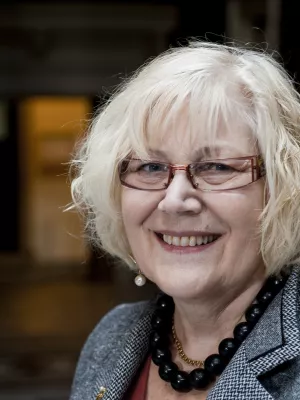
Ingalill Rahm Hallberg
Professor emerita

Family members' experience of participation in the needs assessment when their older next of kin becomes in need of public home help: An interview study.
Author
Summary, in English
Background
The policy that older people should be able live in their own homes in spite of extensive care and social service needs means that close family members are increasingly involved in help provision. Ways must be found to facilitate their situation. Their participation in the needs assessment of their next of kin may be crucial.
Objectives
The aim of the study was to illuminate close family members’ experience of having an older next of kin becoming in need of public home help, their participation in the needs assessment procedure and the decisions about their next of kins’ public home help.
Participants
The sample was 27 close family members (mean age 63, range 42–93 years) chosen by their older needs-assessed next of kin.
Methods
An interview using a thematic interview guide formed an everyday dialogue jointly constructed by the interviewer and the interviewee. Thereafter an interpretative content analysis was conducted on the transcribed interviews.
Results
One overarching category was illuminated: “Feeling disconfirmed or confirmed in the needs assessment, when feeling pressed by the responsibility and struggling to balance the needs of the family.” Four principal categories with sub-categories were derived: (1) Experiencing existential ruminations and the need to help. (2) Help giving and receiving as a difficult balance between needs. (3) Feeling overlooked or acknowledged as having an influence on the needs assessment. (4) Hopes about the home help being fulfilled or dashed.
Conclusion
The findings imply that the main focus is on the help seeker, overlooking the contribution of family members representing and providing help. A more holistic needs assessment approach is required with a framework and working methods that involve and support the family as a whole.
The policy that older people should be able live in their own homes in spite of extensive care and social service needs means that close family members are increasingly involved in help provision. Ways must be found to facilitate their situation. Their participation in the needs assessment of their next of kin may be crucial.
Objectives
The aim of the study was to illuminate close family members’ experience of having an older next of kin becoming in need of public home help, their participation in the needs assessment procedure and the decisions about their next of kins’ public home help.
Participants
The sample was 27 close family members (mean age 63, range 42–93 years) chosen by their older needs-assessed next of kin.
Methods
An interview using a thematic interview guide formed an everyday dialogue jointly constructed by the interviewer and the interviewee. Thereafter an interpretative content analysis was conducted on the transcribed interviews.
Results
One overarching category was illuminated: “Feeling disconfirmed or confirmed in the needs assessment, when feeling pressed by the responsibility and struggling to balance the needs of the family.” Four principal categories with sub-categories were derived: (1) Experiencing existential ruminations and the need to help. (2) Help giving and receiving as a difficult balance between needs. (3) Feeling overlooked or acknowledged as having an influence on the needs assessment. (4) Hopes about the home help being fulfilled or dashed.
Conclusion
The findings imply that the main focus is on the help seeker, overlooking the contribution of family members representing and providing help. A more holistic needs assessment approach is required with a framework and working methods that involve and support the family as a whole.
Department/s
- Department of Health Sciences
- Integrative Health Research
Publishing year
2006
Language
English
Pages
1033-1046
Publication/Series
International Journal of Nursing Studies
Volume
43
Issue
8
Document type
Journal article
Publisher
Elsevier
Topic
- Nursing
Keywords
- Family help
- Experience
- Participation
- Needs assessment
- Public home help
Status
Published
Research group
- Integrative Health Research
ISBN/ISSN/Other
- ISSN: 1873-491X

